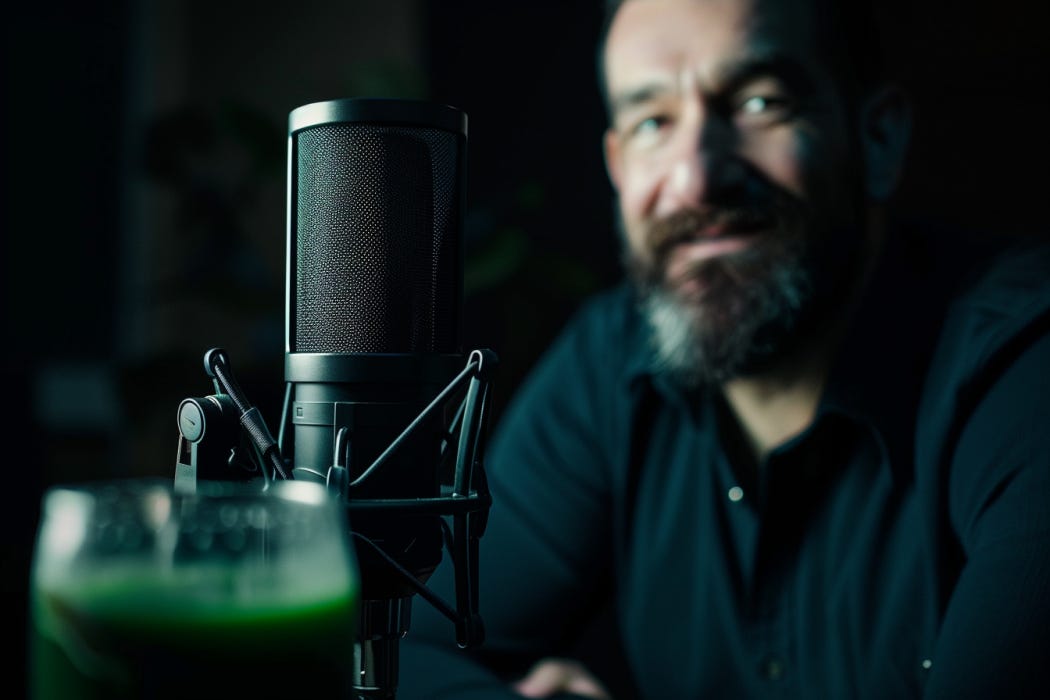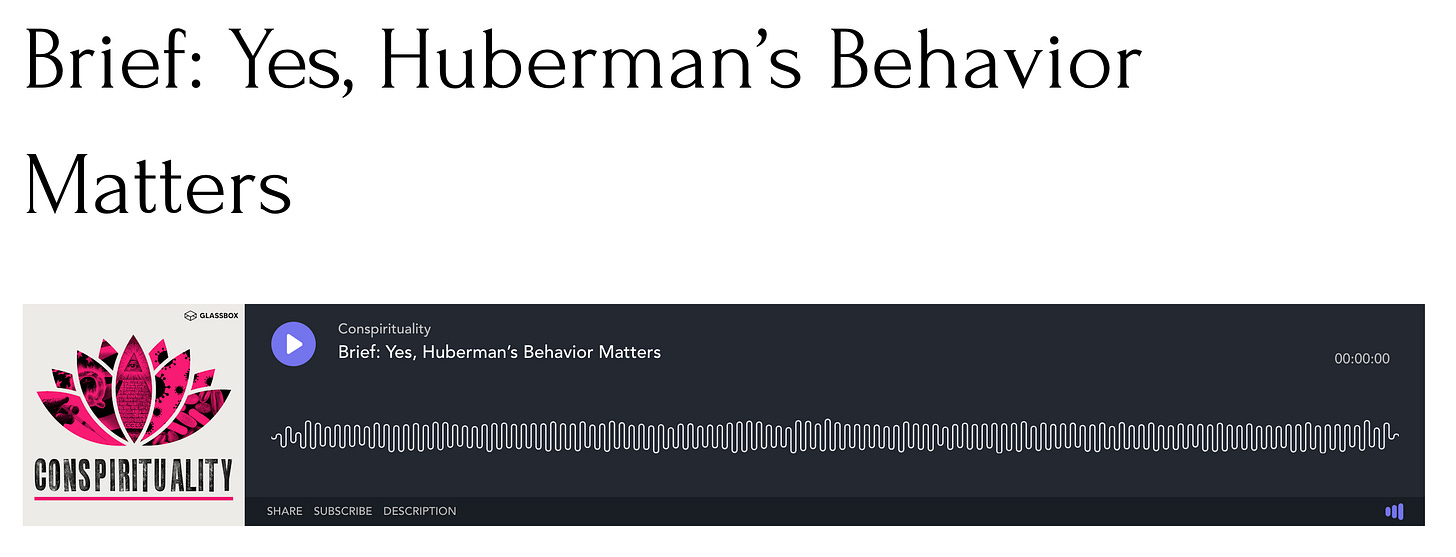Why Andrew Huberman's behavior matters
Pseudoscience and pseudotherapy are parallel harms
On Monday, New York magazine published an expose on Andrew Huberman that I played a small role in. Much of my week has been focused on this topic, so I briefly want to share a few things.
Here’s the paragraph from the article, in full.
On every episode of his “zero-cost” podcast, Huberman gives a lengthy endorsement of a powder formerly known as Athletic Greens and now as AG1. It is one thing to hear Athletic Greens promoted by Joe Rogan; it is perhaps another to hear someone who sells himself as a Stanford University scientist just back from the lab proclaim that this $79-a-month powder “covers all of your foundational nutritional needs.” In an industry not noted for its integrity, AG1 is, according to writer and professional debunker Derek Beres, “one of the most egregious players in the space.” Here we have a powder that contains, according to its own marketing, 75 active ingredients, far more than the typical supplement, which would seem a selling point but for the inconveniences of mass. As performance nutritionist Adam McDonald points out, the vast number of ingredients indicates that each ingredient, which may or may not promote good health in a certain dose, is likely included in minuscule amounts, though consumers are left to do the math themselves; the company keeps many of the numbers proprietary. “We can be almost guaranteed that literally every supplement or ingredient within this proprietary blend is underdosed,” explains McDonald; the numbers, he says, don’t appear to add up to anything research has shown to be meaningful in terms of human health outcomes. And indeed, “the problem with most of the probiotics is they’re typically not concentrated enough to actually colonize,” one learns from Dr. Layne Norton in a November 2022 episode of Huberman Lab. (AG1 argues that probiotics are effective and that the 75 ingredients are “included not only for their individual benefit, but for the synergy between them — how ingredients interact in complex ways, and how combinations can lead to additive effects.”) “That’s the good news about podcasts,” Huberman said when Wendy Zukerman of Science Vs pointed out that her podcast would never make recommendations based on such tenuous research. “People can choose which podcast they want to listen to.”
AG1 responded to the author, Kerry Howley, by promoting its “science-backed” results, which are often touted by the company, sponsored podcasters, and people like Andrew Huberman, who is also a scientific advisor for AG1.
Given that AG1 is trying to defend its research, I sent them the following questions on Monday:
I’ll be following up on Kerry Howley’s NY Magazine article regarding Andrew Huberman on the podcast and potentially in press. So far, it’s impossible to discern the efficacy of individual ingredients included in AG1 given that the blend is proprietary and the dose levels are not listed. As you are aware, supplements are under-regulated in America, so you could see how not listing dose levels so that consumers can check against scientific research could cause confusion.
I’d love to receive any scientific literature you have that show health benefits of the ingredients in AG1 compared against dose levels in the product. I’d also love to see any literature regarding “synergy” between ingredients. Finally, if you can point me to a webpage you have hosted on AG1 that lists contraindications to adaptogens, I’d be grateful. There are many listed in the literature, yet I failed to find a page with that information on your site.
To their credit, they replied. But their reply didn’t really attend to any of questions. They failed to address the contraindications concern. They somehow included this sentence, which I remain baffled by.
We use science and research, not perceptions of small or large amounts, to drive the formulation of AG1.
As for the research questions, let’s just say they didn’t provide anything satisfactory. In fact, I covered AG1’s response in full in this video:
Of course, this was only a small piece of a much larger story regarding Huberman’s behavior around women. The reporting has been attacked by a variety of people—not only men and Huberstans, though predominantly so—while a lot of the responses from women can essentially be boiled down to “here we go again.”
Simply put: men don’t like being held accountable for their behaviors.
To discuss this larger topic, Matthew and I just published a Conspirituality Brief.
I particularly appreciate these insights from Matthew:
Here’s why it matters, beyond the fact that there’s no way those women went on record for fame or money, and beyond the fact that there is no private life for the influencer who uses his personal story to sell a lifestyle that will impact your private life.
Huberman's grandiosity drives him to opine on relationship, sex, and addiction issues as if he is an expert instead of a hot mess. This is a form of pseudotherapy that hides a very negative situation. Pseudoscience and pseudotherapy are parallel harms, both using manipulative jargon to convince consumers and women respectively that the influencer is well-researched and using best practices to genuinely be of service. Both are toxic mimics of care.
For me, the lack of scientific proof regarding AG1’s health claims exemplifies a broader issue with the unregulated supplements industry, and wellness-speak in general: without need for scientific consensus—even a single study—verifying their aspirational marketing, companies and influence remain unchecked, monetizing people’s ambitions and fears around their bodies.
Which is inexcusable. The story of Andrew Huberman and AG1 is one of many such tales. But as it’s one of the most influential, and lucrative, it’s worth exploring in more detail. I’ll be on this beat as more details emerge.





When I first saw the ads for AG1 I laughed my ass off🤣 Obvious bullshit claims are obvious. I really despise the "wellness" industry as it's responsible for my friend's death from cervical cancer😥 She refused medical treatment and used supplements and such to try and treat it. The FDA needs to start cracking down hard on these charlatans. Oh, the beauty industry is also rife with bullshit. All marketing is propaganda and it's all rotting people's brains.
The way you do 1 thing is the way you do all things. Huberman was a scammer in his personal relationships, didn't give a damn about the health and lives of those women, giving HPV (and thus possibly cancer) to at least 1 of them that we know of so far. So obviously he's a scammer in his "professional" life as well, not giving a damn about the health of his listeners/fans and possibly putting their lives at risk too. I really think Sarah, the woman in the article who contracted HPV from Huberman, should call a lawyer. There could be a case here that sets legal precedent.